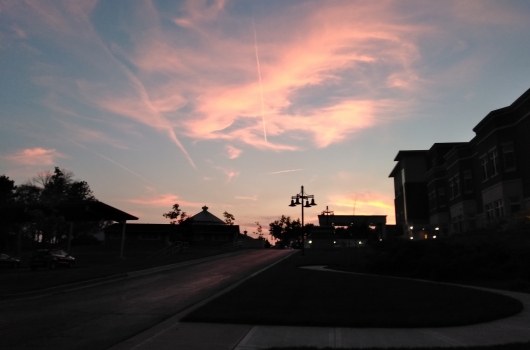Creative and Artistic Resistance
 A view of the sunset from Marillac Center
A view of the sunset from Marillac Center
In early September, the NBAhosted a 2.5-day Anti-Racism/Pro-Reconciliation Training, co-sponsored with Reconciliation Ministry and the Greater Kansas City Region. Nadine Comptonparticipated as an NBA XPLOR Resident and Intern with the NBA Development and Marketing Team, and she shares this reflection.
I recently completed Anti-Racism Pro-Reconciliation training as part of my marketing and development internship with the NBA.
Like other XPLOR Residents, I had already gone through this experience during orientation, so I believed that I knew what to expect.
But this time there was an aspect of the training that was new for me. Co-facilitator David Bell, who is the Minister for Indigenous Peoples Concerns at Yakama Christian Mission, told a story of a local student who had come to work with him because her grandmother had been adopted from the reservation. Her grandma and her children had married and had kids with settlers from the local community so the student that had come to work with David had white skin and red hair. She could not speak the language of her grandmother and did not know any of her indigenous customs or traditions. She came to the realization that she had become what the colonizers wanted. Her indigenous identity had been erased.
This story hit me particularly hard. I myself am half Filipina, half Canadian, but am white passing. I am not fluent in my mother’s native language of Tagalog, even though it was my first language and I can still understand most of it.
I also don’t know much about Filipino history or even my Filipino family’s history. Both of my grandparents passed away before I was born and growing up I’d only see my relatives every other year for a couple weeks when we’d go visit the Philippines.
In order for me to educate myself about my own people, I have to hunt for this knowledge. From Wikipedia, I learned that my grandmother’s family is of Portuguese Jewish descent – her maiden name is an Italian standardization of the original Portuguese name, which itself had been misspelled due to the pronunciation of the Hebrew word. From a lecture on Filipino Comics/Komiks tradition I was introduced to Filipino Komikeros (traditional komik-makers). I learned how Filipinos satirized Spanish colonization and the subsequent American occupation through political cartoons. Afterwards, while having dinner with event organizers, I became aware of current efforts to create and protect Asian-centric art spaces.
In the words of a fellow AR/PR training attendee, this “creative and artistic resistance” is one of my community’s traditions – despite hundreds of years of oppression, they have and are resisting white supremacy. It is a tradition that I can practice and participate in.
What this training has done for me is to lend more meaning to my self-education in Filipino history. It makes the Facebook messages I send my mother’s sister more important. It motivates me to maintain and strengthen the relationship I have with my cousin’s family who immigrated from the Philippines to Canada. To me, all of this work is not merely keeping in touch with relatives. It is resistance against assimilation. While my whiteness gives me immense privilege and power, I will not let it claim my identity. I will not be complicit in my own colonization.
Printer-friendly version here >>
More AR/PR Training Stories
As the health and social services general ministry of the Christian Church (Disciples of Christ), the National Benevolent Association partners with congregations, regions, general ministries, and a variety of Disciples-related health and social service providers to create communities of compassion and care. Founded in 1887 by six women responding to the needs of the day and on their doorsteps, for 130 years the NBA has continued to serve “the least of these.” Learn more at www.nbacares.org.